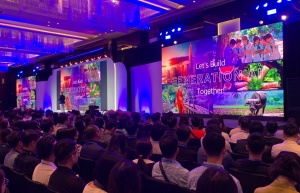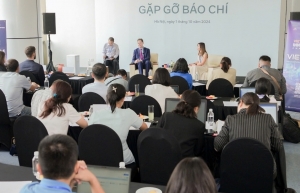Future opportunities in AI for Vietnam
Arthur D. Little’s survey of representatives of 80 network operators worldwide, two-thirds of which have deployed AI in their operations, found that 71 per cent cited improving customer experience as one of the main benefits of implementing it; optimising network operations ranked second with 63 per cent of respondents; improving labour efficiency (39 per cent); improving decision-making, and reducing operating expenditure followed.
 |
| Nguyen Phong Nha, deputy director, Authority of Telecommunications, Ministry of Information and Communications |
Similarly, an Omdia 2024 survey shows that most networks believe that generative AI will positively impact their business within the next two years. Operators with high confidence in GenAI are translating into investment. However, only a quarter of operators have a dedicated budget for GenAI. Meanwhile, for the remainder, the lack of budget may be due to a lack of key performance indicators to measure use cases.
The use of AI in telecoms businesses remains relatively limited and confined to specific use cases, primarily in network operations and customer-communication functions.
While there are many use cases for AI for telcos, the majority of these use cases are still being evaluated. Some use cases have been built by operators with minimum viable products; some have finished products, but that does not mean all have yielded positive results. The manual nature of AI implementations to date means that many projects are slow and expensive to implement.
Implementing AI is more than just implementing a technology. It is a way to work more efficiently, taking automation to the next level. Unpacking and quantifying its value is challenging because the effectiveness of applications indirectly impacts the success of products and services.
There is practical implementation of AI in some carriers. For instance, China Mobile has purchased hardware and built its own data centre including graphics processing units and accelerators as part of the Jiutian large language model project.
Reliance Industries, the parent company of Indian telecom company Jio, has partnered with Nvidia to build supercomputing infrastructure for AI. Reliance Industries aims to provide infrastructure to scientists, developers, and startups across India and create relevant applications and services for Jio’s 450 million customers.
Elsewhere, Softbank has partnered with Nvidia to build data centres designed to host GenAI and wireless applications. The new centres will handle both AI and 5G workloads.
Data-driven architecture is key to maintaining accuracy and consistency across the network. Using a common model ensures data flows smoothly across all systems and is accurately served in all automated workflows.
AI needs data, and data analytics needs AI. Many operators today face significant challenges in developing coherent strategies to fully exploit related technology. Operators in the early stages of AI experimentation may underestimate what is needed, especially in terms of data, to successfully deploy it at scale.
Many carriers lack a cohesive strategy that allows data to flow horizontally across the organisation under a single model. Some specific challenges in getting data ready for AI include lack of clean data, lack of a common model, and lack of context.
In fact, the time and investment required to collect, clean, transform, and store data in the right format is often disproportionately higher than the time it takes to use it. The process of creating data lakes and data warehouses has been going on for years, but it has yet to give carriers the ability to deploy AI at scale across their entire organisation.
Vietnam is not an exception to this trend. Vietnamese telecommunications enterprises have also realised the advantages and trends of applying AI in telecoms networks as inevitable and vital.
The impact on Vietnamese telecommunications businesses is not outside the impact of AI on related businesses around the world. AI will impact all business activities from network operations, marketing, and sales to business administration and measuring the customer experience. For GenAI, most use cases will help operators reduce costs and improve employee efficiency but will not generate new revenue. The most common use cases today include chatbots/virtual assistants, use case automation for call centres, and anomaly detection. Operators are focusing on the right use cases, although they may not have established performance indicators to measure the impact.
Chatbots/virtual assistants are considered the most mature and impactful GenAI use cases, closely followed by call centre use cases. Other tasks, such as anomaly detection, network planning/design, and root cause analysis, are still in their infancy, but these use cases are becoming increasingly important to network operators.
The power of AI chatbots is remarkable due to the ability to collect and contextualise data to be able to perform customer service related tasks, and the future of AI assistants will lie in the ability to interact with humans as perfect as normal human interaction.
 | Two Vietnam startups selected for AWS Generative AI Accelerator Amazon Web Services (AWS), a subsidiary of Amazon.com, announced on September 18 that two Vietnamese startups–AI Hay and Kompato AI (the GenAI subsidiary of Trusting Social)–have been selected for the AWS Global Generative AI Accelerator programme. |
 | The future of AI in business: integrating technology with human oversight Sylvester Kinuthia, head of transaction banking at Standard Chartered Bank Vietnam, delves into the opportunities and challenges of AI application in business, and how Standard Chartered works to ensure effective and ethical AI deployment. |
 | Meta chief outlines how Vietnam can become an 'AI dragon' Semiconductors and AI are two important factors in Vietnam's strategy for high-tech development. Thao Griffiths, head of Public Policy Vietnam at Meta, stresses the need for ongoing collaboration among government, tech companies, and training institutions to enhance the country's standing in the global tech landscape. |
What the stars mean:
★ Poor ★ ★ Promising ★★★ Good ★★★★ Very good ★★★★★ Exceptional
 Tag:
Tag:
Related Contents
Latest News
More News
- Citi economists project robust Vietnam economic growth in 2026 (February 14, 2026 | 18:00)
- Sustaining high growth must be balanced in stable manner (February 14, 2026 | 09:00)
- From 5G to 6G: how AI is shaping Vietnam’s path to digital leadership (February 13, 2026 | 10:59)
- Cooperation must align with Vietnam’s long-term ambitions (February 13, 2026 | 09:00)
- Need-to-know aspects ahead of AI law (February 13, 2026 | 08:00)
- Legalities to early operations for Vietnam’s IFC (February 11, 2026 | 12:17)
- Foreign-language trademarks gain traction in Vietnam (February 06, 2026 | 09:26)
- Offshore structuring and the Singapore holding route (February 02, 2026 | 10:39)
- Vietnam enters new development era: Russian scholar (January 25, 2026 | 10:08)
- 14th National Party Congress marks new era, expands Vietnam’s global role: Australian scholar (January 25, 2026 | 09:54)




















 Mobile Version
Mobile Version